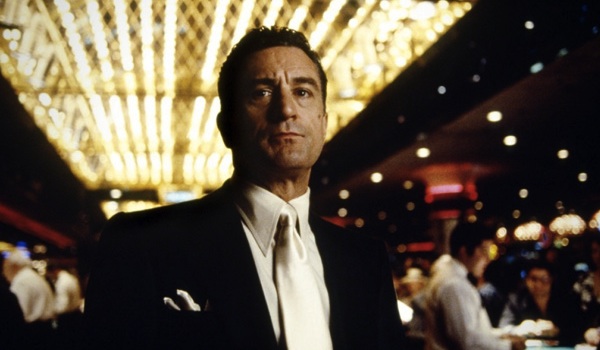Casino Review
The 1990s were a fascinating period in the career of Martin Scorsese. It might not have been his most creatively fruitful decade, but he really started to experiment and step away from what’d become known for—The Age of Innocence, Kundun, etc. Casino, then, is an anomaly because it’s so (for lack of a better word) Scorsese. And because it’s merely good, one has to wonder if he’d gone back to the well one too many times.
Casino, like Goodfellas and a lot of Scorsese’s older films, follows seedy gangsters (played by, no surprise, Robert De Niro and Joe Pesci) who get in over their heads. Sam “Ace” Rothstein (De Niro) is one of the sharpest gambling minds in Las Vegas. Though he isn’t Italian, the Kansas City mob trust him above anyone else to run its casino, the Tangiers. Sammy doesn’t have a license to work in a casino, but his childhood buddy, made man and Vegas enforcer Nicky Santoro (Pesci), tells him all he needs to do is apply because the application will get lost forever in a sea of paperwork.
The hundred-million dollar business is merely a front for Sammy and Nicky’s bosses. They skim money off the top (a process meticulously detailed in the film’s brilliant opening), and while everyone in Vegas knows, these two guys take good care of anyone who’s in any position to cause them trouble.
Problems ensue, of course. They, too, are outlined broadly in the film’s opening 20 minutes. So what goes wrong if it isn’t where the road begins or ends? The heavy reliance on narration doesn’t help (at least in the same way it helped Goodfellas), but it’s far from the film’s biggest problem.
That would actually be Sharon Stone, who plays Ginger, Sammy’s wife. This role earned Stone her first and (to date) only Oscar nomination, but both she and her character are nails-on-a-chalkboard annoying. Ginger is an awful drug addict and a terrible, unfaithful wife. As played by Stone, she’s also as shrill as a siren.
Worse still, the film’s screenplay (which comes courtesy of Scorsese and the author of the book upon which the film is based, Nicholas Pileggi) commits near character assassination by thrusting Ginger upon Sammy time after time. He’s supposed to be “the guy who always covers his bets,” meaning he never gets himself into a situation that might compromise his business and reputation. Ginger is a black hole in that respect, and he keeps going back, almost inexplicably.
The film is a whopping three hours long, and while the inter-workings of the casino and the mob earn their keep, the interpersonal stuff knocks this film down a few pegs. We just spend so much time with weak, inconsistent character-building material, and while Ginger is the the worst offender, she’s not the only one. Nicky feels way too much like Tommy DeVito, and he, too, gets wrapped up in Ginger’s craziness. Sammy, meanwhile, is oddly low-key (though De Niro’s quiet intensity works pretty well).
Casino, of course, is impeccably crafted. The opening scene is filled with killer tracking shots, and Scorsese’s usual reliance on The Rolling Stones’ music is arguably put to use better here than any other film of his. That said, Casino is only a marginally satisfying final product. For another director, it might be the shining star in his or her filmography. But when the bar is set so high, a film like this feels weaker than it might objectively be.

















2 Responses to Casino Review